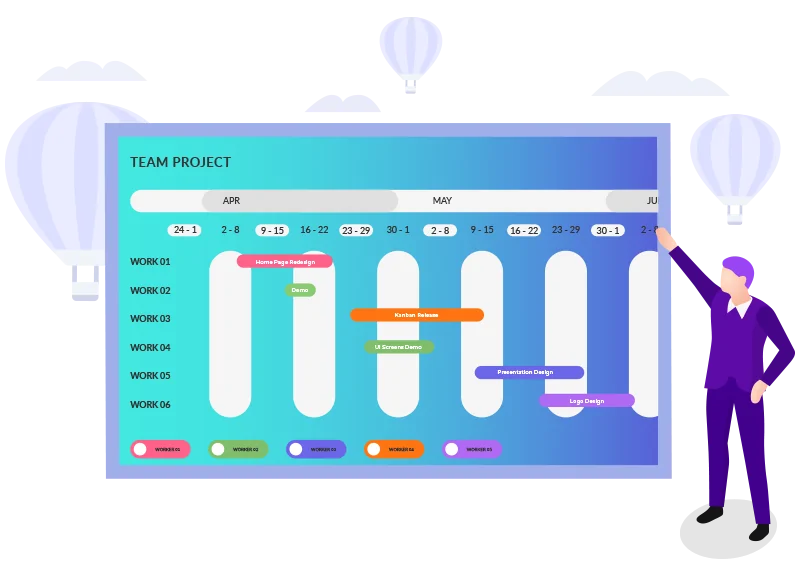Project management is a critical discipline that involves planning, organizing, and controlling resources to achieve specific goals within defined constraints of scope, time, and cost. This article explores two fundamental aspects of project management: cost control and project scheduling, which are instrumental in ensuring successful project delivery within budget and timeline constraints.
Cost Control in Project Management
1. Definition and Objectives
Cost control refers to the processes and techniques used to ensure that a project is completed within the approved budget. The objectives of cost control are to identify potential cost overruns early, minimize unnecessary expenses, and maximize resource utilization efficiency. By implementing robust cost control measures, project managers can make informed decisions, optimize resource allocation, and mitigate financial risks associated with project execution.
2. Cost Estimation Techniques
Accurate cost estimation is a crucial step in project planning and serves as the foundation for effective cost control. Several techniques can be employed to estimate project costs:
Bottom-up Estimation: This technique involves breaking down the project into smaller work packages and estimating the costs of each package individually. These individual estimates are then summed up to arrive at the total project cost. Bottom-up estimation is typically more accurate but also more time-consuming.
Analogous Estimation: This approach uses the actual costs of previous, similar projects as a basis for estimating the cost of the current project. It relies on historical data and leverages the experience gained from past projects. Analogous estimation is relatively quick but may lack precision for projects with unique characteristics.
Parametric Estimation: This method relies on statistical models and historical data to calculate project costs based on predefined parameters, such as project size, complexity, or duration. Parametric estimation is often used when detailed information about the project is not yet available, and it can provide a rough estimate relatively quickly.
3. Cost Monitoring and Control Processes
Once the project is underway, it is crucial to monitor and control costs to ensure adherence to the approved budget. Several processes and techniques can be employed:
Earned Value Management (EVM): EVM is a methodology that integrates scope, schedule, and cost data to measure project performance and predict future trends. It compares the planned value (budgeted cost) with the earned value (completed work) and actual costs, providing insights into cost and schedule variances.
Cost Variance Analysis: This process involves comparing the actual costs incurred against the planned or budgeted costs, identifying deviations, and taking corrective actions. Cost variance analysis helps project managers identify areas where costs are exceeding or falling below expectations, enabling proactive cost management.
Cost Control Measures: If cost overruns are detected, project managers may implement various cost control measures, such as adjusting resource allocations, modifying project scope, implementing cost-saving strategies, or renegotiating contracts with suppliers or vendors.
Project Scheduling
1. Significance and Objectives
Effective project scheduling is crucial for coordinating activities, allocating resources, and ensuring timely project completion. Proper scheduling helps project managers identify critical paths, dependencies, and potential bottlenecks, enabling them to optimize resource utilization and meet project deadlines. The objectives of project scheduling include minimizing project duration, maximizing resource efficiency, and maintaining stakeholder commitments.
2. Scheduling Techniques
Several techniques can be employed for project scheduling:
Gantt Charts: Gantt charts provide a visual representation of project tasks, their durations, and interdependencies over time. They are useful for communicating project plans, tracking progress, and identifying potential scheduling conflicts or resource over allocation.
Critical Path Method (CPM): CPM is a technique that identifies the longest sequence of project activities, known as the critical path, which determines the project’s overall duration. It helps project managers focus on critical activities and prioritize resource allocation to avoid delays.
Program Evaluation and Review Technique (PERT): PERT is a probabilistic method used to estimate project durations, considering uncertainties and risks. It accounts for optimistic, pessimistic, and most likely time estimates for each activity, providing a more realistic timeline for project completion.
3. Resource Allocation and Leveling
Effective resource allocation and leveling are essential components of project scheduling. This process involves assigning resources (e.g., personnel, equipment, materials) to project activities and resolving over-allocations or conflicts. Resource leveling helps ensure that resources are not overloaded and that project activities can be executed efficiently without resource constraints.
4. Schedule Monitoring and Control
Schedule monitoring and control involve tracking progress against the baseline schedule, identifying deviations, and implementing corrective actions when necessary. Regular progress reporting, milestone reviews, and variance analysis can help project managers identify potential schedule delays and take proactive measures to mitigate risks or adjust schedules accordingly.
Integration of Cost Control and Project Scheduling
Project scheduling directly impacts project costs, as delays or inefficient resource utilization can lead to cost overruns. Conversely, cost constraints may affect the timeline and resource allocation for project activities. Aligning cost and schedule baselines is essential for effective project management, as changes in one area may necessitate adjustments in the other.
Strategies for Effective Integration
To achieve successful integration of cost control and project scheduling, several strategies can be employed:
Integrated Project Management Tools: These tools and software solutions can provide a centralized platform for managing and monitoring both cost and schedule aspects simultaneously. They enable real-time tracking of project performance, resource allocation, and budget utilization, facilitating informed decision-making and proactive adjustments.
Regular Progress Reviews: Regular progress reviews involving key stakeholders can help identify deviations from planned costs and schedules, enabling timely corrective actions. These reviews should analyze cost and schedule variances, assess resource utilization, and identify potential risks or issues that may impact project delivery.
Change Management Processes: Effective change management processes are crucial for maintaining alignment between cost and schedule baselines. These processes should consider the implications of changes on both costs and schedules, ensuring that adjustments are made accordingly and that necessary approvals are obtained before implementing changes.
Best Practices and Challenges
Best Practices
To effectively manage project costs and schedules, several best practices should be followed:
☑ Accurate estimation and planning during the project initiation phase: Comprehensive planning and accurate estimation are essential for establishing realistic cost and schedule baselines. This should involve accounting for potential risks, uncertainties, and historical data.
☑ Effective communication and stakeholder involvement: Clear and consistent communication with project stakeholders, including sponsors, team members, and external parties, is crucial throughout the project lifecycle. Stakeholder involvement ensures alignment, transparency, and effective decision-making.
☑ Continuous monitoring and control processes: Robust monitoring and control processes, supported by appropriate tools and reporting mechanisms, enable early identification of deviations and facilitate timely corrective actions. Regular progress tracking, variance analysis, and risk assessment should be integrated into project management practices.
Common Challenges and Pitfalls
Despite best practices, project managers may encounter various challenges and pitfalls when managing costs and schedules:
☑ Unrealistic estimates: Estimates based on incomplete information, optimism bias, or lack of experience can lead to significant cost and schedule overruns, jeopardizing project success.
☑ Lack of risk management strategies: Failing to identify and address potential risks can result in unforeseen events disrupting project plans and jeopardizing budgets and timelines.
☑ Poor communication and coordination: Ineffective communication and coordination among project team members, stakeholders, and external parties can cause misalignments, delays, and ultimately, cost and schedule overruns.
☑ Scope creep: Uncontrolled changes or additions to project scope can significantly impact both costs and schedules, leading to project deviations and potential failures.
☑ Resource constraints: Limited availability or inadequate allocation of resources can cause delays and inefficiencies, impacting project costs and schedules.
Conclusion
Cost control and project scheduling are interrelated and critical components of effective project management. By implementing robust cost estimation, monitoring, and control processes, combined with effective scheduling techniques and resource allocation strategies, organizations can increase their chances of delivering projects within budget and on time.
Continuous improvement, adoption of best practices, and leveraging integrated project management tools can further enhance an organization’s ability to manage costs and schedules successfully. Additionally, fostering a culture of transparency, effective communication, and proactive risk management can help mitigate challenges and ensure successful project delivery.
Remember, managing project costs and schedules is an ongoing process that requires diligence, attention to detail, and the ability to adapt to changing circumstances. By embracing these principles and strategies, project managers can navigate the complexities of project management and increase the likelihood of achieving desired outcomes. Struggle with managing project costs and schedules? Nimble’s integrated solutions offer powerful cost estimation, real-time monitoring, and efficient scheduling tools. Take control of your project constraints with Nimble today, signup for a Free trial.












